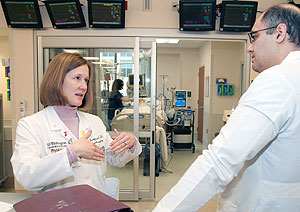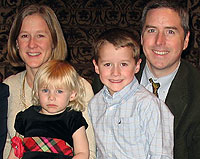One Friday in early February, heart surgeon Jennifer S. Lawton, M.D., wore a glittering pin on the lapel of her white doctor’s coat. The pin was shaped like a cocktail dress and covered with red rhinestones. As she walked through the hospital corridors, people asked her about the unusual accessory.
Lawton told them it was a symbol for National Wear Red Day, part of the American Heart Association (AHA) campaign to raise awareness about heart disease in women. Then she would relay some startling facts.

“In this country since 1984, more women than men have died each year from cardiovascular disease,” says Lawton, associate professor of surgery in the Division of Cardiothoracic Surgery. “Women are two times more likely than men to die from heart surgery, and, every year, heart disease kills more women than all cancers combined.”
Although Lawton is committed to lessening the impact of heart disease on both women and men, she is especially concerned by differences in heart care between women and men.
“There are so many disparities with women who have heart disease,” Lawton says. “It starts when women come to the hospital with a heart attack. It takes longer for them to be admitted and longer to be diagnosed. And they are less likely to get the treatment they need.”
Lawton serves on the volunteer board of the AHA and is part of its speakers bureau. She grants interviews and gives lectures around the St. Louis area to teach people about heart disease in women.
“Jennifer has established herself as a champion for women with cardiovascular disease,” says colleague Michael K. Pasque, M.D., professor of cardiothoracic surgery. “She has the knowledge, speaking skill, presence, dedication and energy to take this fight to the appropriate public forums. These are our mothers, our wives, our sisters and our daughters. It is the noblest of causes, and she is the most able and dedicated of advocates on the behalf of women.”
A gifted surgeon
Petite and soft-spoken, Lawton doesn’t initially seem like the kind of person who would join the fast-paced, pressure-cooker world of cardiac surgery. But she says that she thrives on it.
“Heart surgery is never dull — every day is different,” she says. “And it’s very rewarding to be able to dramatically improve and even save people’s lives.”
Ralph J. Damiano Jr., M.D., the John M. Shoenberg Professor of Surgery and chief of cardiac surgery, has worked with Lawton for 15 years.

“At every level I’ve been associated with Jennifer, she has been superb,” he says. “During her time here, she has developed into one of the leading cardiac surgeons of her generation.”
Frequently, Lawton will be in the operating room four days a week. She performs coronary artery bypasses, valve repairs and replacements, extraction and reimplantation of pacemakers and emergency surgeries, such as repairing tears in the aorta.
Nader Moazami, M.D., associate professor of surgery and surgical director of cardiac transplantation and the total artificial heart program at Barnes-Jewish Hospital, works with Lawton on the cardiac surgery team.
“Her excellent technical abilities are paired with her ability to deliver compassionate care to all her patients,” he says.
As a tertiary care center, Barnes-Jewish Hospital gets many difficult cases that other clinics don’t have the technology or expertise to handle. Many of these patients have had a previous heart surgery, so they might have scarring or adhesions that can disguise the heart’s usual features, and it takes both patience and experience to safely treat them.
“In these cases, it can look like you poured glue in the chest cavity,” Lawton says. “That makes it harder to locate structures and adds time to the surgery.”
Lawton also has become adept at the demanding art of performing surgery on the beating heart. This approach can be better for patients because it eliminates the need for the cardiopulmonary bypass pump, which circulates blood and supplies oxygen to the patient’s tissues while the heart is stopped for surgery. Studies have shown that women, even more than men, benefit from surgery done with the heart still beating.
Pasque says that Lawton is one of the most technically gifted heart surgeons he has worked with.
“And she has a truly extraordinary work ethic that stands out even in a division that is amply populated with work ethic,” he says.
|
Jennifer S. Lawton |
|
Joined the WUSTL faculty in: August 2001 Research funding: American Heart Association Beginning Grant-in-Aid; and the Thoracic Surgery Foundation for Research and Education Nina Starr Braunwald Career Development Award, a prestigious national award for promising female cardiac surgeons Awards: The Caring Spirit Award is Lawton’s most prized honor. The Barnes-Jewish Hospital award goes to a physician who shows outstanding compassion for patients. |
Heart studies
Lawton also runs a research laboratory. The research team is studying isolated heart cells to find out how to better protect the heart from stress during surgery.
By exposing individual heart cells to low oxygen levels or high salt conditions, researchers can determine what happens to cell function under abnormal conditions.
Lawton has found that under stress conditions heart cells swell and lose some of their ability to contract. This also happens after heart surgery and is known as postoperative stunning.
In isolated heart cells, swelling and contraction problems also occur when the cells are exposed to drugs used to stop the heart for surgery. But if the cells are also treated with certain other drugs, they do fine — they can contract normally under stress.
“We believe it might be beneficial to add these drugs to the solution used to stop the heart or to the solution used to preserve hearts for transplantation,” Lawton says. “The drugs might even improve the outcome for people suffering a heart attack.”
The logical choice
Lawton attended medical school at Hahnemann University in Philadelphia. A class in human anatomy opened her eyes to her future career. “I loved the gross anatomy class,” she says. “And then when I first did surgery, I felt like I belonged there.”
Lawton was attracted to heart surgery because the physiology of the heart appealed to her. Basically, the heart is a pump, and it works by some fairly simple principles, she says.
“With the heart, there are problems that you can think through with logic,” she says.
After medical school, Lawton went to the Medical College of Virginia for her general surgery residency and became a research fellow in Damiano’s laboratory. She and Damiano worked together again at Penn State Milton S. Hershey Medical Center, where Lawton did her cardiothoracic fellowship.
“When Jennifer came to my research lab at Virginia, I was immediately impressed with her intellect and her curiosity,” Damiano says. “She was one of the best research fellows I’ve had in my lab. Since joining the faculty here, she has excelled in every way — as a clinical surgeon, as a researcher and as a teacher for our fellows.”
Family adventures
In her leisure time, Lawton shows the same love of a challenge that’s evident in her work. She and her family like to ski, but her favorite vacation pastime is fishing in saltwater flats — the calm, shallow ocean waters off the southern coasts. The powerful fish lurking there can easily outweigh the person trying to snag them.
“We catch a lot of bonefish, and when they take your line out, you can’t control it. It’s like mad,” she says.
Lawton shows off a prize fish in a photograph behind her desk — a once-in-a-lifetime catch. It’s a 110-pound tarpon whose scales shine like polished steel.
“When you hook a fish like that, it jumps completely out of the water,” she says. “It’s so much fun.”
Lawton is the mother of two young children: a son, Owen, 6, and a daughter, Madeline, 3. Her husband, Mark Grimm, M.D., is an ear, nose and throat surgeon with Sound Health Services.
As a two-doctor family with kids, they have to manage complicated work and family schedules. But all in all, Lawton says she thinks there is a significant advantage to being married to someone in the profession.
“Sometimes you can’t help thinking about your work after you go home,” Lawton says. “Then it’s really nice to have someone who can empathize. If you have an emergency at work and can’t come home, they will say, ‘I’m sorry. I know how you feel. Good luck.'”
Lawton says that heart surgery has advanced greatly and become much safer with far fewer complications and deaths. In the future, she sees cardiac surgery evolving further toward cardiac intervention, making it increasingly common to use minimally invasive techniques to repair the heart without opening the chest. She hopes that more women will be attracted to the field.
“Medical school classes are half women now,” she says. “But they are choosing other specialties. I’d like to see that change.”